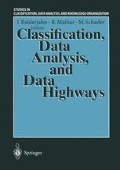Abstract
The Feature Pattern Analysis (FPA), as introduced by Feger (1988), is a method which analyzes a set of observed patterns with respect to co-occurrence. The mathematical formalism of the FPA and the several logically equivalent alternative forms of its representation as geometrical configurations, sets of contingencies and sets of prediction rules are described. Mathematical conditions for the uniqueness and existence of Type I and Type II FPA-solutions are discussed. A fast algorithm is developed to construct a two dimensional FPA-solution using Hasse-diagrams.
Access this chapter
Tax calculation will be finalised at checkout
Purchases are for personal use only
Preview
Unable to display preview. Download preview PDF.
References
BJÖRNER, A., LAS VERGNAS, M., STURMFELS, B., WHITE, N., ZIEGLER, G.M. (1993): Oriented Matroids, Cambridge University Press, Cambridge.
BOKOWSKI, J. (1994): On Recent Progress in Computational Synthetic Geometry. Preprint TH Darmstadt.
BOKOWSI, J., KOLLEWE, W. (1992): On Representing Contexts in Line Arrangements, Order, 8, 393–403.
BOKOWSKI, J., STURMFELS, B. (1989): Computational Synthetic Geometry, Springer Verlag, Berlin - Heidelberg - New York
BREHM, M., (1995): Grundlagen der Feature Pattern Analysis, Master Thesis.
BREHM, M., (1996a): The Representation of Feature Pattern Analysis-solutions as Pseudoline-arrangements. In H. Feger and M Brehm, (eds.), (Under Review) New developments in Feature Pattern Analysis.
BREHM, M., (1996b): Existence and Construction of FPA-solutions. In H. Feger and M Brehm, (eds.), (Under Review) New developments in Feature Pattern Analysis.
FEGER, H. (1988): Spatial Representations of Feature Patterns. In H. H. Bock (eds.), Classification and Related Methods of Data Analysispp. 431–437. Amsterdam: North Holland.
FEGER, H. (1994): Structure Analysis of Co-occurrence Data. Aachen: Shaker Verlag.
GRéNBAUM, B. (1972): Arrangements and spreads, CBMS Regional Conference Series in Math., 10, Amer. Math. Soc, Providence, R.I.
FOLKMAN; J. and LAWRENCE J., (1978): Oriented Matroids, J. Combinatorial Theory, Ser. B, 25, 199–236.
RINGEL, G. (1956): Teilungen der Ebene durch Geraden oder topologische Geraden, Math. Zeitschrift, 64, 79–102.
RINGEL, G. (1957): Über Geraden in allgemeiner Lage, Elemente der Mathematik, 12, 75–82.
Author information
Authors and Affiliations
Editor information
Editors and Affiliations
Rights and permissions
Copyright information
© 1998 Springer-Verlag Berlin · Heidelberg
About this paper
Cite this paper
Brehm, M. (1998). Mathematical Aspects of the Feature Pattern Analysis. In: Balderjahn, I., Mathar, R., Schader, M. (eds) Classification, Data Analysis, and Data Highways. Studies in Classification, Data Analysis, and Knowledge Organization. Springer, Berlin, Heidelberg. https://doi.org/10.1007/978-3-642-72087-1_14
Download citation
DOI: https://doi.org/10.1007/978-3-642-72087-1_14
Publisher Name: Springer, Berlin, Heidelberg
Print ISBN: 978-3-540-63909-1
Online ISBN: 978-3-642-72087-1
eBook Packages: Springer Book Archive

